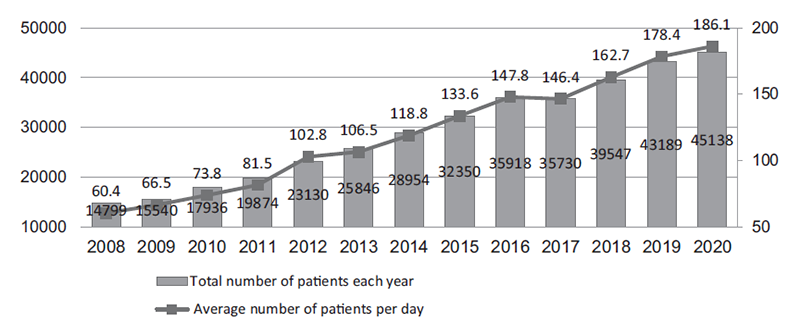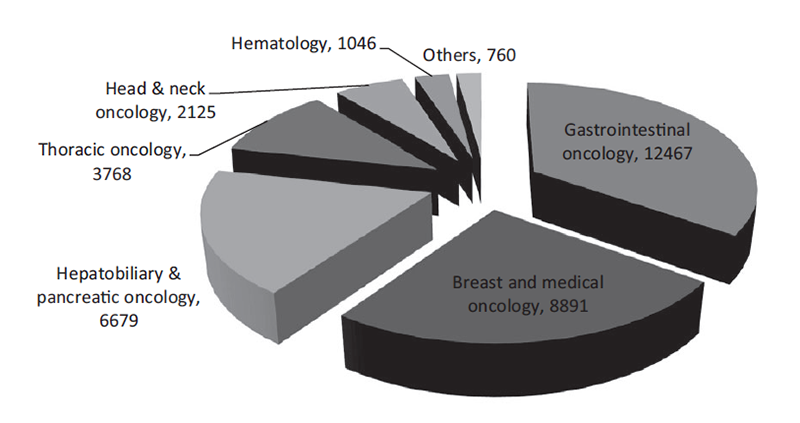Annual Report 2020
Outpatient Treatment Center
Masafumi Ikeda, Koichi Goto, Takayuki Yoshino, Mukohara Toru, Susumu Okano, Yosuke Minami, Miki Kondo, Kayoko Nakata, Naomi Ito, Kenji Kawasumi, Yoshihiro Iwamoto, Noriaki Sato, Kyoji Iiduka, Sayuri Noro, Chiharu Hirano
Introduction
The Outpatient Treatment Center is responsible for anticancer treatment, such as chemotherapy, molecular targeted agents, and hormonal therapy for patients with all types of cancer. Our basic policy is to provide high-quality anticancer treatment and to support the lifestyle of patients and their families. Our goals are to 1) provide appropriate and satisfactory management of chemotherapy and 2) share the mindset of outpatients with our staff. We can provide high-quality and comfortable treatments with the collaboration of medical oncologists, nurses, pharmacists, laboratory technicians, medical social workers, hospital clerks, and clinical research coordinators.
The Team and What We Do
Our team consists of one director, five medical oncologists, one nurse manager, two deputy nurses, 28 nurses, two chief pharmacists, two pharmacists, one resident of pharmacist, two assistants of nurses, and two reception staff. The Outpatient Treatment Center has a total of 73 beds including 5 beds for infusions or blood transfusions. In 2020, a total of 45,138 patients received anticancer treatment, with the average number of patients per day being 186.8 (Figure 1). As it was on an increasing trend year by year, the number of nurses was increased. The detailed numbers for each department are 12,467 in Gastrointestinal Oncology, 8,891 in Breast and Medical oncology, 6,679 in Hepatobiliary and Pancreatic Oncology, 3,768 in Thoracic Oncology, 2,125 in Head and Neck oncology, 1,049 in Hematology, and 760 in other departments (Figure 2). The monthly steering committee is held on the third Monday, during 16:30—17:00, every month with the participation of medical oncologists, nurses, laboratory technicians, pharmacists, clinical research coordinators, and hospital clerks. We discuss the monthly activities and problems of this center raised from each section, such as nursing, pharmacy, and clinical trials, and plan the remedies for these problems.


Before initiating new regimens and clinical trials at this center, staff meetings with medical oncologists, nurses, and pharmacists are held to safely and appropriately manage these treatments.
We have a telephone consultation service (hotline) for outpatients who have received anticancer treatments at this center. Pharmacists and nurses who are highly experienced in outpatient treatment respond with countermeasures for adverse events and answer any queries from patients or their families by telephone. If the consultations are serious, they transfer them to medical oncologists. This service was started in 2008 and gradually increased. In 2020, a total of 3,225 calls were received. The service contributes to prevent serious adverse events and relieve patients’ anxiety.
Research activities
"Efforts to unify care for skin toxicities associated with anti-EGFR antibody agents" presented at the 35th Japan Cancer Nursing Society
"Efforts to realize group orientation for patients receiving outpatient chemotherapy" presented at the 35th Japan Cancer Nursing Society
"Efforts to open a chemotherapy-nursing outpatient clinic" presented at the 37th Japanese Society of Medical Oncology
"Chemotherapy-nursing outpatient clinic started" received Special Award in 2020 QC Activity
Education
We train nurses and pharmacists with special knowledge who can enhance patients’ self-care skills and appropriately resolve some problems arising with patients and their families during anticancer treatment.
Future Prospects
We always manage the bed control efficiently at the Outpatient Treatment Center, and attempt to resolve the problem of waiting times for patients. We have re-evaluated the contents of regimens that were only available on admission, such as introducing short hydration for regimens requiring a long time, and adjusted the regimens to enable receiving at the Outpatient Treatment Center. Under the coronavirus pandemic, we are planning to create an orientation video using the homepage and QR code so that patients can view it repeatedly at home with their families, because the family of patients are restricted to coming to our hospital with the patient. Thus, we are attempting to actively accept additional patients who need to be treated with chemotherapy at outpatient clinics. Furthermore, a lot of new regimens and clinical trials are also being actively accepted.
